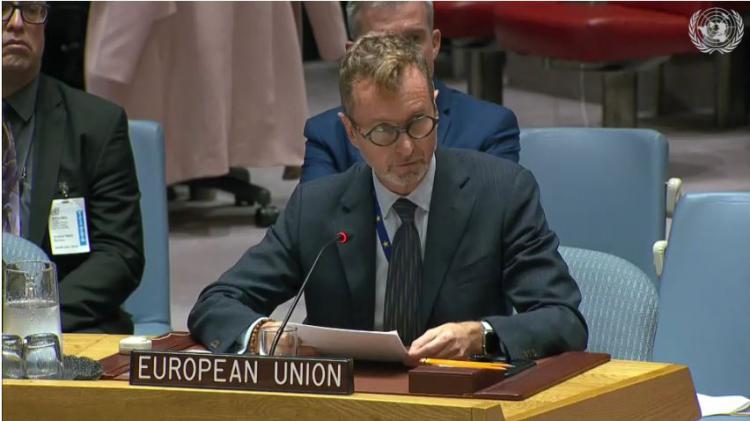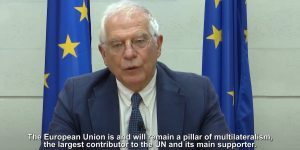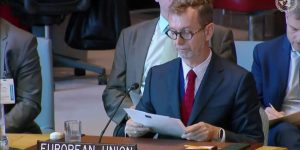5 November 2019, New York – Statement on behalf of the European Union and its Member States by H.E. Mr. Silvio Gonzato, Deputy Head of Delegation, Delegation of the European Union to the United Nations, at the Security Council Debate on the situation in Bosnia and Herzegovina
Mr. President
I have the honour to speak on behalf of the European Union and its 28 Member States.
The Candidate Countries Montenegro*and Albania*, as well as Ukraine, align themselves with this statement.
I join other speakers in welcoming High Representative Valentin Inzko back to the Council and in assuring him of the European Union’s continued support. I also welcome the Permanent Representative of Bosnia and Herzegovina and thank him for his statement.
A year has now passed since the holding of the country’s general elections, and we note with grave concern that governments are still not formed on State and Federation levels, and that the State parliament is not fully functioning. This state-of-affairs seriously hinders the implementation of much-needed reforms which would allow Bosnia and Herzegovina to move forward on its EU path. It further raises questions regarding the willingness of political leaders to fulfil the aspiration of their fellow citizens to join the European Union.
In this context, the European Union urges once again all political leaders in Bosnia and Herzegovina to uphold their responsibilities and proceed with government formation without any further delay. We strongly encourage them to start showing a spirit of compromise and a determination to reach an agreement on the remaining areas of discord. The agreement reached last August contained positive elements in this regard.
Moreover, we reiterate our call on all political leaders to refrain from nationalist and provocative rhetoric. We also recall that revisionism and glorification of war-criminals contradicts EU values and is incompatible with the prospect of integration into the European Union. The European project is built on reconciliation; Bosnia and Herzegovina institutions and leaders need to uphold their commitment to lasting reconciliation.
The European Union insists on the need for the authorities to work towards strengthening the rule of law, in particular the independence and impartiality of the judiciary, fighting corruption and organised crime, countering radicalisation as well as guaranteeing the independence of the media, safety of journalists, promoting youth employment and education, and ensuring the full and effective implementation of socioeconomic reforms.
In order to prevent a humanitarian crisis in the coming winter, Bosnia and Herzegovina needs to take urgent measures to ensure the management of migration and access to the asylum system, including closing the unsuitable site of Vučjak and increasing reception capacities across the territory on the basis of technical feasibility and security criteria. Coordination between all competent authorities is key in order to make good use of all the resources made available by the European Union.
The European Union also reiterates that election-related issues, including provisions for holding local elections in Mostar and the Bosnia and Herzegovina Presidency, should be addressed as soon as possible, taking into account the situation in the country and in line with European standards and decisions of the Constitutional Court in Bosnia and Herzegovina. The European Union underlines that no legislative or political steps should be taken which would make the implementation of the European Court for Human Rights Sejdić-Finci ruling and related rulings more challenging. Bosnia and Herzegovina also needs to implement OSCE/ODIHR recommendations in order to improve the democratic quality of its electoral processes.
The European Union reiterates its unequivocal commitment to Bosnia and Herzegovina’s EU perspective as a single, united and sovereign country. With regards to the political and security situation on the ground and the importance of maintaining a safe and secure environment, the European Union also reiterates its firm support to EUFOR Althea and to the mandate entrusted to it by this Council.
To conclude, five months after the Commission adopted its Opinion, the focus is now on Bosnia and Herzegovina and the credibility of its commitment to the EU path. To make this commitment credible, we need counterparts with whom to speak and engage concretely on the reforms which are needed to advance towards the EU. Beyond words, we now need tangible proof that Bosnia and Herzegovina is willing to do what it takes to become one day a member of the EU.
* Montenegro and Albania continue to be part of the Stabilisation and Association Process.




